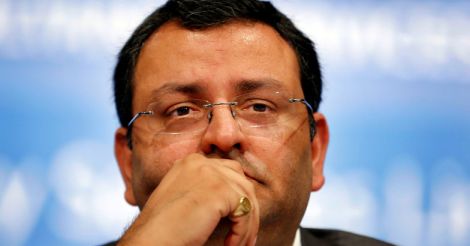Mumbai: Escalating his fight against Tatas, ousted Tata Sons chairman Cyrus Mistry on Monday said government has an "inherent obligation" to "remedy and repair breakdown" in the governance of Tata Trusts, the major shareholder of the group's promoter firm Tata Sons, alleging absence of appropriate structure and ethical behaviour of trustees.
Days ahead of extraordinary general meetings of six major Tata firms, including TCS and Tata Motors, which would discuss a resolution seeking Mistry's removal as director, he said the "governance of Tata Trusts has to become more accountable, transparent".
In a representation to the shareholders of six Tata Group firms, he said Tata Trusts enjoy many exemptions under law including exemptions from tax since they are solely for the benefit of the general public of India.
However, he said: "In the absence of an appropriate governance structure and ethical behaviour of trustees, it would become an inherent obligation of the government to remedy and repair breakdown in the governance of such trusts."
Seeking the government's intervention in his ongoing battle, Mistry said government must ensure the working of the Tata Trusts have a defined, transparent governance structure.
"People who have been complicit or have enabled ethical and legal transgressions or have demonstrated a blatant disregard for good governance should not be allowed continue," he added.
The governance charter across the Tata Group, including the holding and operating companies requires repair to conform to company law and global best pratices such as protection of interests of all stakeholders, including minority shareholder, Mistry said.
Stating that the governance of Tata Trusts has to become more accountable and transparent, he said: "At the heart of the sustainability of the Tata Group is governance reform, throughout the institution."
Asking the shareholders of the companies to vote against the resolution to oust him and Nusli Wadia, Mistry said: "The Tata Group is no one's personal fiefdom. It does not belong to any individual, not to the trustees of Tata Trusts, not to the Tata Sons directors, and not to the directors of the operating companies."
It belongs to all the stakeholders, including each and every shareholders, he added.
Mistry said that the very future of the Tata Group lies in how the trustees govern the Tata Trusts, since the main trust property is the holding of shares in Tata Sons.
"The conferment of all decision making power in one man or a 'high command' among them is unethical, improper and a breach of trust," he said.
It is critical that serious decisions of severe magnitude and consequence are not taken whimsically, without much thought, or for unstated collateral objectives, Mistry said in his representation.
"It is necessary to have a strong method of checks and balances in the trustees' decisions, particularly if decisions they take could indirectly give them personal benefits," Mistry said.
(With agency inputs)
























 Cyrus Mistry
Cyrus Mistry